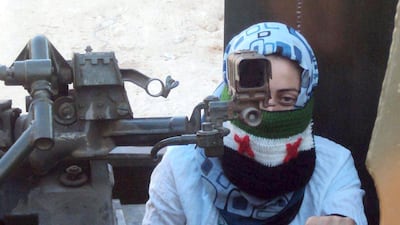GAZIANTEP // In the most dangerous part of the Middle East and in a culture ruled by men, one Syrian woman not only joined the Free Syrian Army, but went on to form the first all-female battalion, fighting against president Bashar Al Assad’s forces on the outskirts of the capital, Damascus.
She calls herself Bahar, and is unwilling to give her real name as she fears for her relatives who remain in Syria, especially her two brothers who have been imprisoned by the Assad government.
She is 35 and comes from Harasta, a small town in the eastern suburbs of Damascus – an area known as East Ghouta. Before the war, she was an accountant with the health department and lived with her parents.
Bahar became involved in anti-government protests in Harasta right from the start in April 2011, joining street rallies in her hometown and helping to deliver food to families cut off from supplies by the regime in punishment for the demonstrations.
That was what she was doing when the Syrian security forces caught her in late December 2011.
“First they put me in a small, dirty room before they started interrogating me. They put a blindfold on me and started questioning me, mostly about my involvement with the protesters. It was very scary,” she says.
She was released after three days in custody. “I didn’t spend too much time in jail because back then the regime was trying to calm people down so they released me,” she explains.
When the government began cracking down on street protesters with violence, the Syrian revolution changed radically into an armed movement challenging Mr Al Assad.
This was a turning point for Bahar. Like many other Syrian women at the time, she faced the dilemma of how to protect herself and her fellow Syrians from what she regarded as a brutal government. Unlike for men, the decision to take up arms against the Assad regime was an unusual one for women. But eventually, Bahar concluded that joining the armed movement was her only option.
In April 2013, she joined the Free Syrian Army (FSA) as a nurse on the frontline in East Ghouta, treating and aiding fighters with techniques she learnt from trained nurses also working with the FSA.
After a couple of months, however, nursing was no longer enough for Bahar and she picked up a gun and became a combatant, fighting side by side with men.
She then went even further and began training other women in using guns, creating an all-women brigade in July 2013. She called this brigade the Al Ghouta Free Women Battalion after the name of the area in which it was based.
Bahar announced the creation of the all-female unit in a YouTube video, surrounded by her women comrades who were all brandishing weapons and pledging their dedication to the fight against Mr Al Assad.
After that the brigade was involved in frequent fierce combat with regime soldiers in East Ghouta. When government forces stormed Harasta, Bahar and her battalion were on the front line, holding back the advance.
But Bahar also encountered danger from her own side, the opposition. She received death threats from Islamist factions and then, in January 2015, her two brothers were detained by the government.
In April 2016 she finally decided to leave Ghouta, travelling through underground tunnels to Damascus where she lived in constant fear of being caught by the government.
“By now I’m used to sleeping with my gun under my pillow. It’s not easy to live in a place where death is always waiting for you in every corner of the city,” she says, referring to Damascus.
After staying in the capital for just a few days, she paid nearly US$350 (Dh1,285) for a fake ID and rented a small car which she drove north to the western province of Hama.
“It wasn’t easy to cross all that territory,” she says. “I had to pass through all kinds of militias, more than you can ever imagine.”
In Hama she hid for two months in a small farmhouse owned by locals opposed to the regime and waited for the smuggler who would take her across the border to Turkey. She had to pay the smuggler $1,500. “I couldn’t cross the border legally on my own, because Turkey had closed its borders by then,” she says.
Three months after starting her journey from Ghouta, Bahar reached Gaziantep on the Turkish side of the border in July 2016.
That is where she lives today, sharing a small apartment with opposition activists and waiting for the chance to get to Europe.
“I want to live a normal life, like any woman who dreams of having a family of her own, and I want to continue my education,” she says.
Far from her parents who are in the suburbs of Damascus, and worried for her incarcerated brothers, Bahar is plagued by nightmares.
“Even my dreams are all about conflict and politics. I see myself in war all the time with the smell of death all around me,” she says.
“I don’t know if I can overcome these nightmares that haunt me from my past and live a normal life. I can only try.”
foreign.desk@thenational.ae

